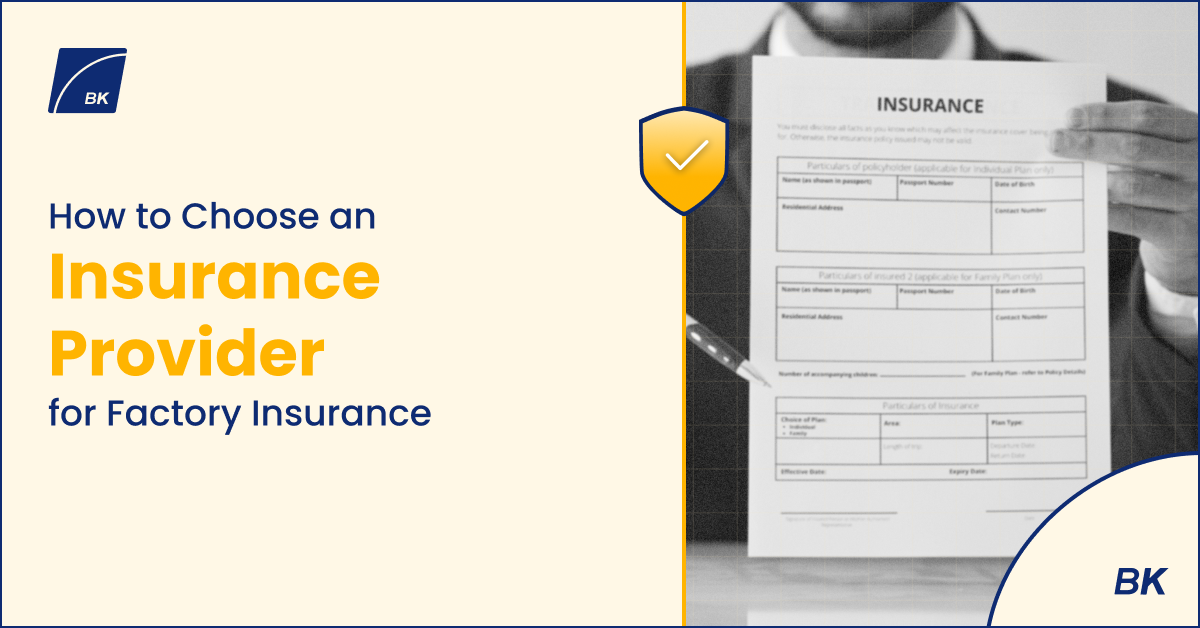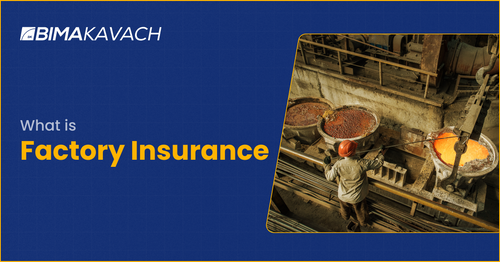Manufacturing's annual production growth rate was 4.7 percent in fiscal year 2023. However, the manufacturing sector's gross value added is lower than the service sector. A record US$ 447.46 billion was exported by manufacturing during FY23, a 6.03% increase over the previous year (FY22). A number of initiatives like Make in India, Digital India, and Startup India have given the Manufacturing (ESDM) sector in India a much-needed boost.
The manufacturing industry is often exposed to unique risks that can result in significant financial losses. Therefore, having adequate insurance coverage is crucial to ensure the long-term sustainability of any manufacturing business. This is where factory insurance stands as a safeguard against the unforeseen, providing a vital layer of protection for businesses in this ever-evolving sector. This insurance is an essential tool for any manufacturing business looking to protect itself against potential risks and ensure its long-term success. In this blog, we will look to demystify the coverage components of a factory insurance policy, the claim process, and other important facets of this specialized form of risk management.
Definition of Factory Insurance
Factory insurance is a type of insurance policy that provides coverage for manufacturing plants and factories against various risks. This type of insurance policy is designed to protect the factory owners from financial losses that may arise due to damage or destruction of the factory building, machinery, equipment, stock, and raw materials. The policy covers a wide range of risks including fire, theft, natural disasters, and accidental damage. It also covers liability claims arising from accidents and injuries that occur within the factory premises.
Factory insurance policies are tailored to meet the specific needs of each factory. In addition, many factory insurance policies offer business interruption coverage, which provides financial support to businesses that are forced to temporarily shut down due to unforeseen events such as fires or floods. The premium for a factory insurance policy depends on the level of coverage required and the risks associated with the factory.
Get Free Quote in Minutes
Core Coverage Areas in Factory Insurance
Factory insurance is designed to protect businesses from a range of risks that could potentially cause significant financial loss. There are several core coverage areas that factory insurance typically covers. These include:
1.Fire & Burglary
Factory insurance typically covers damage caused by fire, including destruction of buildings, machinery, raw materials, and finished goods. Policies may also cover damages resulting from allied perils such as lightning, implosions, explosions, riots, and other related events. Additionally, a factory insurance policy includes coverage against burglary and theft. This extends to theft of raw materials, finished goods, and machinery.
2. Property Damage
Property damage coverage is one of the most important areas of a factory insurance policy. This coverage protects businesses against damage to their physical assets, such as buildings, machinery, and equipment.
3. Business Interruption
Business interruption coverage is designed to provide financial protection to businesses in the event of an unexpected interruption to their operations. This coverage can help businesses cover the costs of lost income, ongoing expenses, and other expenses that may arise as a result of the interruption.
4. Liability Protection
Liability protection is another important area of a factory insurance policy. This coverage protects businesses against legal claims arising from accidents or injuries that occur on their premises. It can also cover legal expenses and compensation payments that may arise as a result of such claims.
5. Goods in Transit
Factory insurance policies can also offer coverage for goods in transit. This coverage provides protection for any goods or products that are being transported from one location to another. It can include coverage for damage or loss that occurs during transit, as well as any liability that may arise from the transportation of goods.
6. Equipment Breakdown
This coverage provides protection for any machinery or equipment that breaks down due to mechanical or electrical failure. It can cover the cost of repairs or replacement of the equipment, as well as any loss of income that may result from the breakdown.
The Claims Process in Factory Insurance
- Notification and Documentation
When an insured event occurs, the policyholder must notify their insurance company as soon as possible. The insurance company will then assign a claims adjuster to investigate the claim and determine the extent of the damage. The policyholder must provide the adjuster with all necessary documentation, such as police reports, medical reports, and receipts for any repairs or replacements.
2. Assessment and Adjustment
Once the adjuster has all the necessary documentation, they will assess the damage and determine how much the insurance company will pay out. The adjuster will take into account the policyholder's deductible and any exclusions or limitations in the policy. The adjuster will then negotiate with the policyholder to reach a settlement that is fair to both parties.
3. Settlement and Recovery
Once a settlement has been reached, the insurance company will issue payment to the policyholder. The policyholder can then use this payment to repair or replace any damaged property. In some cases, the insurance company may choose to pay the policyholder directly for the cost of repairs or replacements. In other cases, the insurance company may choose to work directly with the repair or replacement company to ensure that the work is done to the policyholder's satisfaction.
The claims process for factory insurance can be complex and time-consuming. However, by following the proper procedures and working closely with their insurance company, policyholders can ensure that they receive the full benefits of their insurance policy.

How to Choose an Insurance Provider for Factory Insurance?
When it comes to choosing an insurance provider for factory insurance, there are a few things to keep in mind. It's important to find a provider who can offer the coverage you need at a price that fits your budget. Here are some tips to help you choose an insurance provider:
Comparing Quotes
One of the most important things to do is to compare quotes from different insurance providers. This will help you get an idea of the different rates and coverage options available. Make sure you are comparing apples to apples when it comes to coverage and deductibles. You can use online comparison tools or work with an insurance broker to get quotes from multiple providers.
Understanding Policy Terms
It's also important to understand the terms of the insurance policy you are considering. Make sure you know what is covered and what is not, as well as any deductibles or limits on coverage. This will help you make an informed decision about which policy is right for you.
When reviewing policy terms, pay attention to any exclusions or limitations. For example, some policies may exclude coverage for certain types of equipment or only cover damage caused by specific types of events. It's important to understand these limitations so you can make sure you have the coverage you need.
To sum up, choosing an insurance provider for factory insurance requires careful consideration of coverage options and policy terms. By comparing quotes and understanding policy terms, you can find the right provider and policy to protect your business.
Conclusion:
Factory Insurance, with its multifaceted approach, not only protects tangible assets but also extends a safety net over the intangible elements that fuel the engine of industrial progress. From safeguarding against property damage to addressing the intricacies of machinery breakdowns and business interruptions, Factory Insurance emerges as a strategic investment in the sustained success of manufacturing ventures. As your factory continues to forge ahead, let Factory Insurance be the silent guardian that allows you to navigate uncertainties with confidence. To tailor a policy that aligns seamlessly with the unique needs and challenges of your manufacturing enterprise, consider consulting with insurance professionals who understand the nuances of the industry.
If you have any queries on any topic related to Business Insurance, you may contact BimaKavach. Here, you can get the best recommendation for any insurance product in just 5 minutes.
Frequently Asked Questions
- How are factory insurance premiums calculated?
The calculation of factory insurance premiums depends on several factors, including the size of the factory, the type of machinery and equipment used, the number of employees, and the level of risk involved. Insurance companies also consider the location of the factory, the history of claims, and the safety measures in place when calculating premiums.
2. How is factory insurance accounted for in financial statements?
Factory insurance is accounted for as an expense in the income statement of a company. It is usually classified as a general and administrative expense and is deducted from the revenue to arrive at the net income. The insurance premium paid is also recorded as a current asset in the balance sheet until the coverage period expires. This is the procedure to incorporate factory insurance in final accounts
3. What are the key differences between factory and warehouse insurance policies?
Factory insurance policies cover risks associated with manufacturing processes, whereas warehouse insurance policies cover risks associated with storage and distribution of goods. Factory insurance policies may include coverage for machinery breakdown and business interruption, while warehouse insurance policies may include coverage for theft, damage, and loss of goods during transit.
Recent Update
Ghaziabad Fire: Massive Fire Breaks Out at Cardboard Factory in Bulandshahr Industrial Area
A significant blaze erupted at a cardboard factory
located in the Bulandshahr industrial area of Ghaziabad, Uttar Pradesh. Nine
fire brigades from Ghaziabad and four from neighboring districts swiftly
responded to the scene, successfully containing the fire. Thankfully, no
casualties have been reported.

